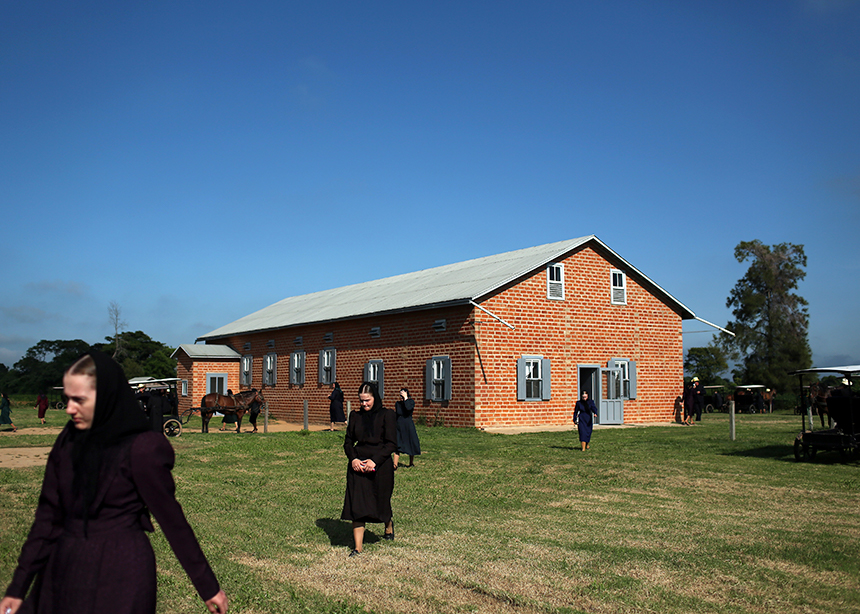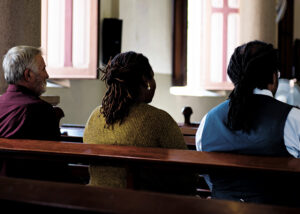Eight men went to prison, the media gaze moved on, and colony life resumed. But the saga of mass rape in the Bolivian corner of our family of faith is far from over.
It’s hard not to talk about something as sensational and consequential as a mass rape case on an intensely conservative colony in the jungled interior of South America. Indeed, it would be irresponsible to remain silent. But Wilmar Harder, former co-coordinator of Mennonite Central Committee’s work with colony Mennonites in Bolivia, responds to all the attention, whether from the BBC or me, with a simple question: “Who tells the story and why?”
Since the 2011 convictions of eight men in the case, the two most prominent efforts to tell the story were by Jean Friedman-Rudovsky and Miriam Toews.
Friedman-Rudovsky is an American journalist who lived in Bolivia for six years. She covered the rape case for Time in 2011. In 2013, she spent considerable time at the Manitoba Colony, staying in the home of the former civic leader. She spoke with numerous women and men. The resulting “Ghost rapes of Bolivia” article for Vice was published in 25 countries in 20 different languages. The accompanying 25-minute video provides a rare first-hand glimpse into the Manitoba Colony, both beautiful and horrific. The people—most notably, the women—speak for themselves.
The Toronto lens
The August release of Women Talking, by one of Canada’s great writers, has again put Bolivian colony Mennonites in the spotlight. Sort of. Similar to interviews Toews has done, the book begins with a note describing the rape crisis and calls the novel a “response in fiction” to the “true-life events.”
In the book, a group of women from the fictional Molotschna Colony gather in a hayloft to discuss how to respond to mass rape.
Toews offers a masterful mixture of images and emotions, ending with a crescendo of metaphors so powerful it made me want to start back at the beginning. That said, her book felt uncomfortably at odds with the conversations I’d had in previous months with people who have thought deeply about their response to the Bolivian crisis.
Someone with Toews’s breadth of imagination is touching on something broader than how mainstream Mennonites should respond to one specific situation but, in that deeper endeavour, shouldn’t the situation she so explicitly uses as her launching pad also be illuminated?
My trouble is not that Toews clearly conflates Bolivia, the Steinbach, Man., of her youth, and Mexican colonies she has visited. The book’s hayloft, mile roads, suspenders, dining halls, coffee fields and summer kitchens belong to places other than the Manitoba Colony. Fiction allows this.
Perhaps it also allows for virtually all of the men of the colony to be away in the city posting bail for the accused rapists so they can return, where the victims will be forced to forgive them or face excommunication, this latter point being something Toews also states as fact in her interviews. In the true-life version, the men actually went to disturbing lengths to ensure suspects were locked up for good—though it took them four torturous years to get to that point—and excommunication for failure to forgive is not the practice.
Fiction can take truth beyond the realm of fact. But it can also be a shortcut. At a minimum, I think Toews owed readers and the people of Manitoba Colony a note that the characters portrayed in the book “could belong to any one of several groups that came to Canada from Russia [some of which moved south],” to borrow and adapt wording from Rudy Wiebe’s Peace Shall Destroy Many. She could have also said the book is not set in Bolivia.
As Toews said in an interview, the characters are based on women she knows, and not through her research of Bolivian colonies. The result is still fascinating, if irritating, in its seeming sloppiness—when carrying buckets of water to livestock, one cannot run —but I don’t think it gets us to the actual isolated Bolivian women.
At one point in the novel, the character taking English minutes of the hayloft gathering, which serve largely as the narration of the book, admits to inserting the word “patriarchy” into the minutes, even though the women would be unfamiliar with the term. An apt word, of course, but the entire book felt like someone putting foreign words in the mouths of others. I would have hoped that someone with the giftedness of Toews might have somehow brought me into the foreign reality of the colony. I wanted to better understand those women. Instead, I feel I read what a literature-steeped, progressive, Torontonian might have colony women think.
But to the extent that the book views colony Mennonites through a North American lens, it contradicts what seems essential in supporting colony women. In the context of interviews and Toews’s earlier writings—including a 2016 non-fiction essay for Granta entitled “Peace shall destroy many”—it is hard not to see in Women Talking a bias towards formal education, literature, and urban western society. That is, a bias towards the narrative of civilization, progress and progressiveness.
Our adoption of progress and civilization—including its rampant individualization, materialism and inherent sense of superiority—is largely why colony Mennonites consider us devoid of moral authority and see us as unwelcome intervenors. It’s a shortcoming as glaring to them as their patriarchy and closedness is to us. We see ourselves as better; they see themselves as better. And the women remain isolated behind a wall of men, beyond the reach of concerned North Americans.
Canadian Mennonite
Wilmar Harder’s question of who tells the story and why was not just for the likes of Friedman-Rudovsky or Toews. It was for Canadian Mennonite magazine. For me. Why talk about the Manitoba Colony crisis?
First, we report news. The push for release of the men in prison and the view of some credible observers that justice has likely not been fully served—as reported earlier in this series (Part 1, Part 2, Part 3)—is news. Second, I am deeply concerned about the victims and possible future victims. Of course, that’s what everyone would say. It’s true, but motivation is complex.
I grew up in the then solidly Mennonite town of Winkler, Man., which included mainstream Mennonites and Mennonites from colonies in Mexico. The latter wore more plaid than the rest of us and had names like Frank or Helen. The churches, social groups and economics of our town were clearly segregated along these lines. Every kid in school knew what a “Mexa” was, and that you didn’t want to be one. When my younger sister Sara was born, I was adamant that her name be spelled without an “h” to differentiate it from the Mexa version.
I have never heard a faith leader—or anyone else, for that matter—acknowledge this segregation. So how genuine, then, is a sudden interest in colony Mennonites when a salacious scandal hits them? Or when does our concern for colony Mennonites lead us to grapple with our own ghosts?
Is there not some small part of us that likes to hear about the dysfunction of colonies, in part because it reinforces our rickety sense of enlightened superiority, even though we know we have, in our embrace of progress, given ourselves over to a world of rampant materialism, busyness, polarization, individualization, destruction of the earth and widespread mistreatment of women?
Toews calls colony people “my people” in interviews. If they are our people, and we are their people, we must seek to see the world through their lens if we expect some degree of the converse.
Harder, now a pastor in Kansas, says that, if outsiders tell the Manitoba Colony story, they should do so “with the greatest humility . . . otherwise it is imperialism from the north.” He in no way downplays the problems on colonies, nor does he imply leaders were innocent in their handling of the crisis. But he does report that colony leaders he met with “openly wept” when discussing the problems in their community.
Perhaps we need to join them. And then learn from each other.
See Part 1: Justice
See Part 2: Enlightenment
See Part 3: Intervention
Online extras for Part 1: https://canadianmennonite.org/ghost1
Online extras for Part 4: https://canadianmennonite.org/ghost2
See also “Mennonites talking.”











Leave a Reply
You must be logged in to post a comment.